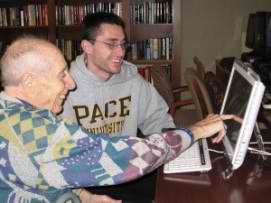Seniors Learn Computing in Intergenerational Program
Author: Nancy Allegrezza
program taught by Professor Jean F. Coppola, Ph.D. at Pace University. Dr. Coppola teaches the Intergenerational Computing service learning course at Pace University in New York. As part of the university's graduation requirements, each undergraduate student must participate in a course that focuses on civic engagement.
In Dr. Coppolas Intergenerational Computing program, students who sign up for the course pair up with two seniors who want to learn computing. The Intergenerational Computing program is the outgrowth of The Consortium for Multi-Faceted Gerontechnology Research that was formed in October 2005 to help address the "digital divide" that many seniors face with using computer technology. Several retirement communities in the New York metropolitan area participate in this consortium and computing classes are held weekly.
 For this program, students meet with their seniors weekly and teach them the basics of computing. Many of the seniors have never learned or even used a computer before this program. The students spend at least an hour each week with each of their seniors on computing instruction. The students blog about each visit and their experience in the Intergenerational Computing program, and at the end of the semester students writes a reflection on the entire semester.
For this program, students meet with their seniors weekly and teach them the basics of computing. Many of the seniors have never learned or even used a computer before this program. The students spend at least an hour each week with each of their seniors on computing instruction. The students blog about each visit and their experience in the Intergenerational Computing program, and at the end of the semester students writes a reflection on the entire semester.
Cheryl Lewis and I had the privilege of meeting Dr. Coppola and two of the nursing professors involved in the program in the fall of 2010. Drs. Coppola, Sharon Stahl Wexler, and Barbara Thomas were speaking at a conference in Philadelphia about technology and seniors. They came to look at the new Telikin touchscreen senior computer. They decided to incorporate Telikin into their senior computing program. Their graduate students have conducted research using Telikin as part of occupational therapy programs (watch the video below!) and have been instrumental in providing ongoing feedback to us here at Telikin.
Seniors Staying Connected through the Intergenerational Computing ProgramHaving the ability to learn computing has made a big difference for the seniors who participate in the program. Many now enjoy emailing, video chatting with Skype, typing letters, searching online for information, playing games, seeing family photos, and more.
Dr. Coppola states, "Computer use has huge benefits for older usersIt helps them cognitively. It keeps them mentally stimulated. Its a brain exercise.
The seniors enjoy staying in touch with their families with computers. They also enjoy the company of their student teachers!
Cheryl, Fred, and I have had the opportunity to attend several of the computing "graduation" ceremonies and have heard the seniors speak about the wonderful relationship they have with their students. Many seniors enroll in the course multiple times.
The university students also have the opportunity to speak about their experience working with their seniors. Some speak of being nervous initially and not knowing what to expect. They participate in a class on sensitivity training where they actually experience what it is like to have vision problems, arthritic hands, difficulty hearing and mobility issues. Most tell how they have thoroughly enjoyed the experience, have made a true friend and some have changed their career path after participating in the course. And many students continue to stay in touch with their seniors who use their new computing skills to communicate with their teachers.
We value our partnership with Dr. Coppola and her colleagues and are pleased to share this information with you!
For more information, you can read this case study about the Intergenerational Computing program, and you can also read more about the entire Gerontechnology Team at Pace University.
Watch this video to see Lizzy, a occupational therapy patient at United Hebrew Rehab Center, which partners with the Pace intergenerational computing program, solve the Memory game on the Telikin computer in 30 seconds. Pace graduate students tested how Telikin helped improve the fine motor skills of OT patients.